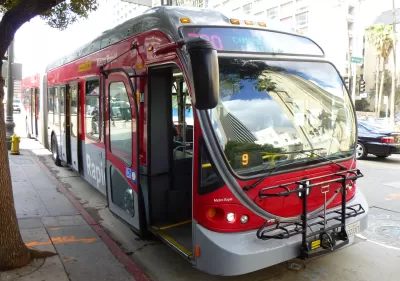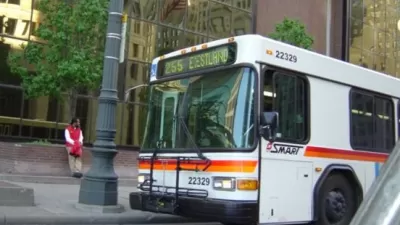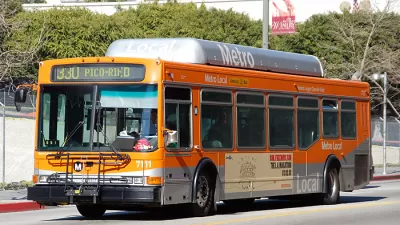The Los Angeles County Metropolitan Transportation Authority will let low-income residents and K-12 students ride for free starting in January 2022.

In an attempt to study the potential for switching to a fare-free system, the Los Angeles County Metropolitan Transportation Authority (Metro) is implementing a two-phase pilot program that will let low-income riders ride for free. Ryan Fonseca reports on the plan, which is projected to save commuters up to $1,200 per year. According to Metro, "about 70% of its current riders earn less than $35,000 annually and would qualify for free fares under the current proposal." The second phase of the proposed program, set to launch in August 2022, would extend free fares to K-12 students. Los Angeles Mayor Eric Garcetti praised the proposal, saying "it's time for us to treat public transit as a public good."
Transit activists, meanwhile, argue that public transit was meant to be a public good all along, and that the proposed program doesn't go far enough to reduce the burden of transit costs for low-income Angelenos. Additionally, segmenting riders and requiring documentation to qualify for the program will likely exclude many qualifying residents. City Councilmember Mike Bonin expressed his concerns about the administrative costs: "I think we need to think about and be very realistic about whether or not the administrative burden of trying to separate 30% of the people [making] above $35K is so burdensome, that it isn't even worth it." Although the program will lead to revenue loss for the agency, fare revenue only makes up 4% of Metro's annual budget.
FULL STORY: Most LA Metro Riders Could Ride For Free Starting Next Year Under New Pilot Plan

Study: Maui’s Plan to Convert Vacation Rentals to Long-Term Housing Could Cause Nearly $1 Billion Economic Loss
The plan would reduce visitor accommodation by 25,% resulting in 1,900 jobs lost.

North Texas Transit Leaders Tout Benefits of TOD for Growing Region
At a summit focused on transit-oriented development, policymakers discussed how North Texas’ expanded light rail system can serve as a tool for economic growth.

Alabama: Trump Terminates Settlements for Black Communities Harmed By Raw Sewage
Trump deemed the landmark civil rights agreement “illegal DEI and environmental justice policy.”

How Community Science Connects People, Parks, and Biodiversity
Community science engages people of all backgrounds in documenting local biodiversity, strengthening connections to nature, and contributing to global efforts like the City Nature Challenge to build a more inclusive and resilient future.

Alabama: Trump Terminates Settlements for Black Communities Harmed By Raw Sewage
Trump deemed the landmark civil rights agreement “illegal DEI and environmental justice policy.”

Dear Tesla Driver: “It’s not You, It’s Him.”
Amidst a booming bumper sticker industry, one writer offers solace to those asking, “Does this car make me look fascist?”
Urban Design for Planners 1: Software Tools
This six-course series explores essential urban design concepts using open source software and equips planners with the tools they need to participate fully in the urban design process.
Planning for Universal Design
Learn the tools for implementing Universal Design in planning regulations.
City of Santa Clarita
Ascent Environmental
Institute for Housing and Urban Development Studies (IHS)
City of Grandview
Harvard GSD Executive Education
Toledo-Lucas County Plan Commissions
Salt Lake City
NYU Wagner Graduate School of Public Service





























